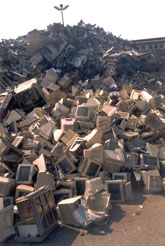Governments vow to speed up efforts on electronic waste after UN-backed conference
04-12-2006 (New York)

The member governments to a United Nations-sponsored global pact on the transport and disposal of hazardous waste agreed today to accelerate their efforts to reduce the impact and damage caused by the rapid recent growth in electronic waste.
After a week-long conference in Nairobi on the Basel Convention on the Transboundary Movement of Hazardous Wastes and their Disposal, delegates pledged to introduce pilot projects to take back used electronic products and to strengthen collaborative efforts to fight illegal traffickers.
The UN Environment Programme (UNEP), under whose auspices the Basel Convention was adopted, said it expected a formal declaration to be issued committing governments to work towards improving their policies and prodding industry to pursue “green design.”
This week the conference heard how a rising global tide of electronic waste, especially in developing countries, is posing serious environmental risks because of the wide range of dangerous pollutants they can contain, from heavy metals to chlorine compounds.
Between 20 and 50 million metric tones of electronic waste – also known as e-waste – are being generated every year because of the growing demand for computers, televisions, radios, mobile phones and other consumer electronics. Many of these products are soon discarded because they are deemed to be obsolete or defunct.
UNEP Executive Director Achim Steiner said it is important that governments develop more effective regulatory regimes so that the market has incentives to respond more positively to the issue of electronic waste.
“By partnering with the private sector and with civil society, they can promote collection chains that channel obsolete goods back to their original manufacturers for recovery and recycling,” he said.
Some 120 governments participated in the Nairobi conference, which was the eighth of its kind to deal with the Basel Convention.
UNESCO supports several PC refurbishing initiatives including mobilizing donors of second-hand PCs, procurement, refurbishment, transportation, distribution, installation, maintenance and training use of refurbished PCs, and disposal at end-of-life of refurbished PCs.
The UN Environment Programme (UNEP), under whose auspices the Basel Convention was adopted, said it expected a formal declaration to be issued committing governments to work towards improving their policies and prodding industry to pursue “green design.”
This week the conference heard how a rising global tide of electronic waste, especially in developing countries, is posing serious environmental risks because of the wide range of dangerous pollutants they can contain, from heavy metals to chlorine compounds.
Between 20 and 50 million metric tones of electronic waste – also known as e-waste – are being generated every year because of the growing demand for computers, televisions, radios, mobile phones and other consumer electronics. Many of these products are soon discarded because they are deemed to be obsolete or defunct.
UNEP Executive Director Achim Steiner said it is important that governments develop more effective regulatory regimes so that the market has incentives to respond more positively to the issue of electronic waste.
“By partnering with the private sector and with civil society, they can promote collection chains that channel obsolete goods back to their original manufacturers for recovery and recycling,” he said.
Some 120 governments participated in the Nairobi conference, which was the eighth of its kind to deal with the Basel Convention.
UNESCO supports several PC refurbishing initiatives including mobilizing donors of second-hand PCs, procurement, refurbishment, transportation, distribution, installation, maintenance and training use of refurbished PCs, and disposal at end-of-life of refurbished PCs.
Related themes/countries
· PC Refurbishment: News Archives 2006
· UNESCO and PC Refurbishment
Share this story:
Contact information
- UN
Source














